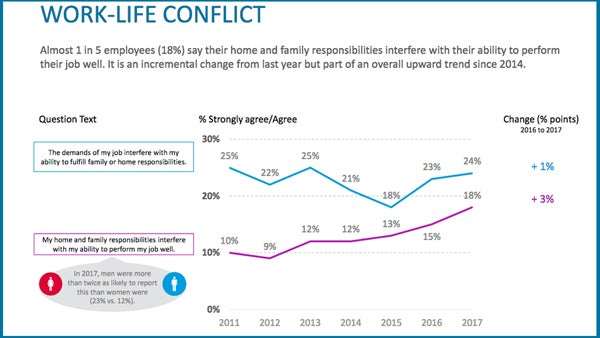Survey: How bosses explain organizational changes matters

(Big Stock)
Bosses, value your employees and be transparent about any changes that are afoot.
Those aren’t exactly popular adages, but according to a new study by the American Psychological Association, they probably should be.
The survey found that workers who have experienced organizational changes at work are less likely to trust their employer and more likely to say they want to leave. They’re also more stressed out at work.
Restructuring changes are increasingly part of work in the US, but there are things employers can do to counter that, says Dr. David Ballard, the head of the American Psychological Association’s Center for Organizational Excellence. The Center spearheaded this year’s Work and Well-being survey.
“When an employer puts things in place to create a healthy work environment they can weather these storms a whole lot better,” he said. And transparency and open communication go a long way.
Stewart Friedman, a professor at Wharton and the founding director of The Work/Life Integration Project, agrees.
“The more that people know about the reasons why things are changing around them that are outside of their control – the less strain and stress they are going to feel,” he said, adding that an open dialogue helps employees and employers through these transitions.
 (American Psychological Association)
(American Psychological Association)
Another important issue: talking politics on the job. “Four out of ten U.S. workers said these political conversations at work have created at least one negative outcome for them. From reduced productivity, poor work quality, difficulty getting their work done, negative feelings about their coworkers,” said Ballard. He says while some employers create policies that try to restrict political conversation, that’s hard to accomplish.
“These conversations are happening. In fact, they’re happening even more since the election than they were before,” said Ballard. “So more effective is to create an environment…where people treat each other decently and are fair to each other and respectful.”
Friedman says talking politics is always tricky on the job — but that welcoming a diversity of opinions is key. He says employers should encourage conversations and dialogue, “about everything.” Employers can approach politics with this philosophy: “The more variety we have in points of view on problems we’re trying to solve, decisions we need to make, the smarter we’re going to be.”
The survey also suggests that if employees feel valued by their bosses — they’re less likely to want to leave. So offering employee recognition programs or extended leave could help reduce turnover rates. Ballard says whatever programs employers want to offer, it just needs to match the specific needs of the employees and the culture.
“So it’s not just about feeling good, about everybody feeling happy at work, this actually translates into business performance. These are people who are less likely to quit the job. They’re people who are more likely to say they are going to give it their all for their employer, because they actually feel appreciated.”
When Friedman started looking at these issues thirty years ago, he says companies weren’t that interested. He says now, that’s changed because they want to hold on to employees.
WHYY is your source for fact-based, in-depth journalism and information. As a nonprofit organization, we rely on financial support from readers like you. Please give today.

